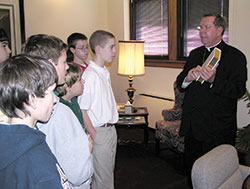Archbishop Buechlein played significant role in renewal of catechesis in U.S.

Archbishop Daniel M. Buechlein, right, shows a special edition of the Catechism of the Catholic Church to a group of students from St. Pius X School in Indianapolis during a visit on Jan. 27, 2009, to his office in the Archbishop Edward T. O’Meara Catholic Center in Indianapolis. Archbishop Buechlein played a significant role in the renewal of catechesis in the U.S. while serving as chairman of the U.S. bishops’ Ad Hoc Committee on the Use of the Catechism of the Catholic Church. (File photo by Sean Gallagher)
By Sean Gallagher
Ken Ogorek admired Archbishop Emeritus Daniel M. Buechlein from afar long before he came to serve as the director of catechesis for the Church in central and southern Indiana in 2007.
In 1997, Ogorek was working as a high school religion teacher in Pennsylvania and then in catechesis in the Diocese of Pittsburgh. He appreciated how Archbishop Buechlein was a leader among a handful of bishops in the U.S. who were spearheading a renewal of catechesis in the Church in America.
“He was a person who stepped up,” Ogorek said. “That’s leadership.”
In 1997, Archbishop Buechlein was chairman of the U.S. bishops’ Ad Hoc Committee on the Use of the Catechism of the Catholic Church. The catechism had been published a few years earlier. The bishops in the U.S. wanted to make sure that extensive quotes from it accurately reflected its meaning, and that catechetical textbooks and other resources in the U.S. were in conformity with it.
This latter task was a challenging one in the first years, recalled Archbishop Buechlein in a 2014 interview with The Criterion.
“It was kind of controversial because the publishers didn’t all agree with what we were doing,” Archbishop Buechlein said. “But I stood my ground.”
Retired Archbishop Alfred C. Hughes of New Orleans served on the committee with Archbishop Buechlein. He noted how the archbishop was “a man of both conviction and diplomacy,” and that these traits eventually resulted in a “very constructive, collaborative relationship” between the committee and publishers.
“His conviction and his ability to work collaboratively with others was a strong reason that made it possible for him to persevere in the face of significant headwinds moving against receiving the catechism and implementing the catechism,” said Archbishop Hughes.
The fruits of the evaluation process for catechetical materials that Archbishop Buechlein helped launch some 20 years ago is still bearing fruit today, said Ogorek.
“He and his closest collaborators revolutionized the relationship between publishers and our episcopal conference,” Ogorek said. “What his work continues to do today is that it gives catechetical leaders the freedom and confidence of knowing that our resources are authentically Catholic.”
Ogorek, who also serves as the president of the National Conference of Catechetical Leadership, said that Archbishop Buechlein also paved the way for the later publication by the U.S. bishops of the National Directory of Catechesis and the United States Catholic Catechism for Adults, both key elements in the continuing catechetical renewal.
Ten years after he first began to look up to him as a hero, Ogorek had the opportunity to work with Archbishop Buechlein as archdiocesan director of catechesis. It wasn’t long after that, though, that Archbishop Buechlein’s health began to fail, thus limiting their opportunities for collaboration.
During one of the times when his health limited his ministry, Archbishop Buechlein wrote a note to Ogorek, which reminded him that the priority the archbishop placed on catechesis at the national level was also important in his ministry in central and southern Indiana.
“He apologized to me because his health was making it difficult for us to interact with each other,” Ogorek recalled. “Of all the things that were on his mind and heart during those months, he was concerned that the attention that he was able to pay to catechetical ministry in the archdiocese wasn’t where he wanted it to be.”
Ogorek said that other catechetical leaders highly regard Archbishop Buechlein.
“I’m not the only person who holds him as a hero,” Ogorek said. “Among my counterparts throughout the country, many of them would say a lot of the same things that I’m saying about him. That’s mainly because he was able to take all of the gifts that he employed here and his special passion for catechesis and really put that into action far beyond the borders of southern and central Indiana.”
Ogorek still seeks to carry on Archbishop Buechlein’s legacy of catechetical renewal in the Church in central and southern Indiana. He is gratified to see here and now the good effects of his former shepherd’s ministry.
“Young people of today have better resources for encountering the real Jesus in part because of Archbishop Daniel’s leadership,” Ogorek said. “And what was his motto? ‘Seek the face of the Lord.’ In a way, the young people of today are able not only to seek, but to find the face and hear the voice of the Lord because of Archbishop Daniel’s legacy and the work that he did faithfully and effectively for so many years.” †
